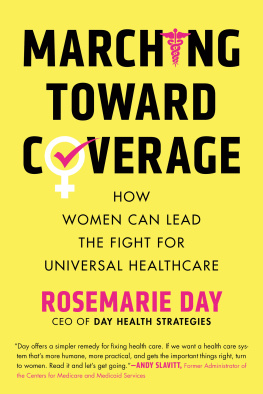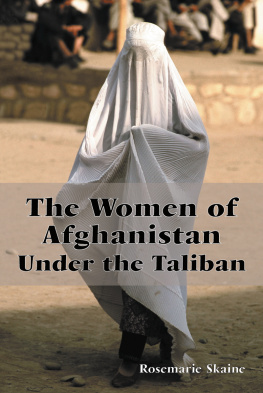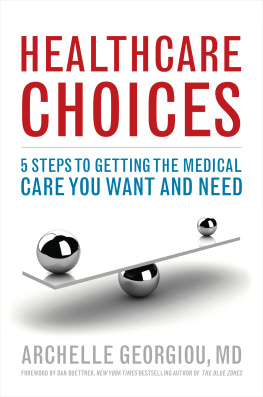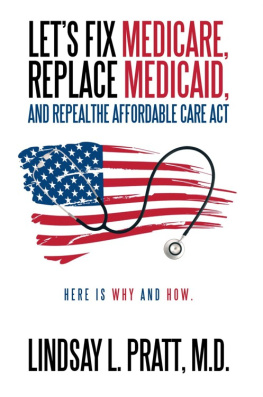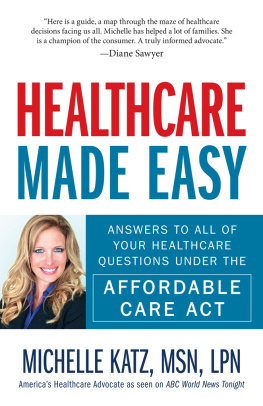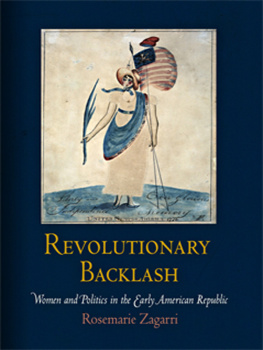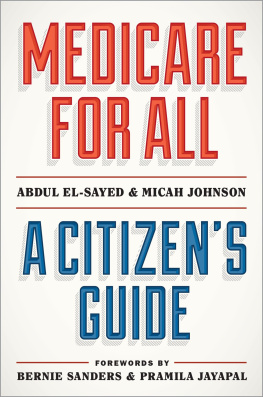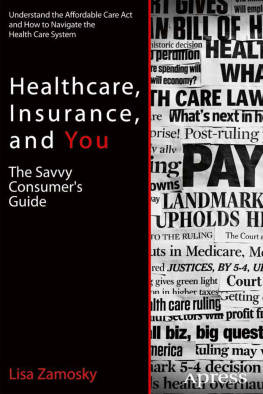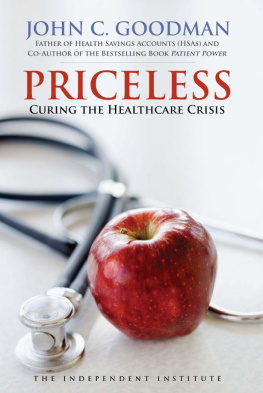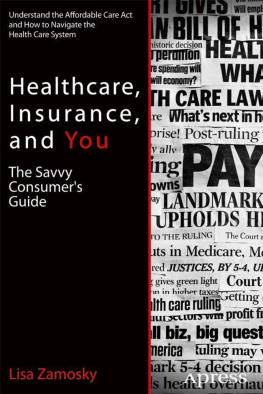Contents
Pagebreaks of the print version
Guide

To my family, and to all the women who struggle to keep their families and communities healthy

Everyone who is born holds dual citizenship, in the kingdom of the well and in the kingdom of the sick. Although we all prefer to use only the good passport, sooner or later each of us is obliged, at least for a spell, to identify ourselves as citizens of that other place.
SUSAN SONTAG , Illness as Metaphor
I am not free while any woman is unfree, even when her shackles are very different from my own.
AUDRE LORDE
PREFACE
W HY DOES OUR HEALTHCARE SYSTEM FAIL SO MANY ? And more importantly, what can we do about it? Thousands of people die each year in the US because they dont have health insurance. Many more cant afford their care and are at risk of losing their coverage every single day. Even though the US is one of the richest countries in the world, our citizens are denied the level of access to healthcare that other, less wealthy countries guarantee to theirs.
Adding insult to injury, the numbers show that this burden is disproportionately carried by women. Women are typically responsible for making up to 80 percent of healthcare decisions for their families, and are often caring for their children and elderly parents simultaneously. Even though this means women are likely to have the greatest amount of experience with the healthcare system, we are often subtly guided away from raising our voices, and may feel hesitant about political involvement.
In the wake of the 2016 election and the rise of the #MeToo movement, many Americansespecially womenare growing angrier. I am certainly one of them. As a mother of three with aging parents, and a person at risk of losing coverage if preexisting conditions are no longer protected under the law, the issue of healthcare hits especially close to home for me. With so many others, I have marched, I have fumed, and I have strategized. Ultimately, I decided to write this book.
As with any complex issue, Ive found that its easier to describe problems than to develop answers. With over two decades of experience implementing new healthcare programs and advising healthcare leaders on best practices, I know that fixing the US healthcare system is an enormous task. Fortunately, while marching alongside hundreds of thousands of women as part of the Womens March on Washington in 2017, I had a big aha moment: I realized that if we could harness this energy and build on it, we could create a movement to make healthcare a right in the US.
I wrote this book to empower you to do just that, by bringing together two key components: knowledge and activism. I know that life is terribly busy and you may not be able to read the entire book. Thats OK! Read some now, save some for later. Some parts may be more important to you now than others. I hope the book, taken as a whole, informs and inspires you.
This is a book about transforming our healthcare coverage system, with feminism as the lens and women as the drivers. The American people have been pushing for better access to healthcare for decadesnow is the time to put the pressure on. Now is the time to march. In difficult times, I take solace in one of my favorite quotes from Dr. Martin Luther King Jr.: The arc of the moral universe is long, but it bends towards justice. In the realm of healthcare, the quote has been modified to suggest that the arc of the healthcare universe is long, but it bends toward coverage.
But the arc wont bend by itself. Together, we have the power to make change if we join forces and act. Please join me as we keep marching toward coverage.
CHAPTER 1

WHY COVERAGE MATTERS
A leader takes people where they want to go. A great leader takes people where they dont necessarily want to go, but ought to be.
ROSALYNN CARTER , former First Lady
I N 2017 , HEALTHCARE ISSUES HIT ME HARD . My eighty-year-old mother fell, was hospitalized, had surgery, and was diagnosed with a serious illness. My eighteen-year-old daughter suffered terrible stomach pains and ongoing weakness that turned out to be celiac disease. And in the middle of all that, I discovered I had breast cancer and had to seek treatment. I was stunned. It felt like things were spiraling out of control. I wanted desperately to help my mother and daughter. My doctors were telling me to take care of myself.
Each of those issues required a tremendous amount of engagement with the healthcare system, including numerous visits with physicians, surgeons, and specialists. However, as difficult as that year was, I found myself continually gratefulnot only because the three of us received the care we needed, but also because, first and foremost, we were able to access that care. My daughter and I were covered by our familys workplace insurance plan. My mother was covered by Medicare. Since we all had health insurance coverage, we could focus on getting better and returning to living our lives, without the nerve-wracking worry about whether we could afford our care and treatments.
Millions of Americans arent as fortunate.
As I write this in 2019, approximately twenty-eight million Americans are uninsured. Thats 12 percent of the population under the age of sixty-five, and the number is starting to grow. Millions more are underinsured, worrying that the coverage they have isnt enough, or that they might lose it entirely.
Who are these people? We all know someone. The thirty-something who wants to leave her job to start her own business but wont, because she cant afford nongroup (individual) health insurance. The newlyweds who just discovered that theyre going to have a baby but arent sure if their policy covers maternity care. The forty-year-old who cant get the mental health treatment she needs because her insurance doesnt cover it. The fifty-year-old whos putting off getting a cancer follow-up test because she doesnt have the money to pay the deductible. And all of the people, now including my daughter and me, who may be vulnerable to losing coverage because of their preexisting conditions. The list goes on and on, and if it hasnt happened directly to you, odds are you know someone whos been concerned about their healthcare access. Inadequate access to healthcare is a common and persistent national headacheand in many ways, the pain is suffered mostly by women.
Think about it. Women are more likely to be caregivers for children and elderly parents, and theyre more likely to be patients themselves. This means that women are the ones who interact with the healthcare system most often and most intimately. In fact, according to the US Department of Labor, women make approximately 80 percent of all healthcare decisions for their families. As a result, underinsurance and skyrocketing medical costs represent more than a national health crisis; theyre a civil rights issue, and the next battlefront for the feminist movement.
Women are serving as the chief medical officers of their families. In the business world, CMOs (or any other kinds of chiefs) can have enormous influence, especially because they tend to wield massive purchasing power. But as the CMO of a family unit, a womans influence and purchasing power are quite limited. Most treat healthcare problems as strictly personal or private family issues, instead of recognizing their problems with health coverage as part of a larger systemic failure. So instead of sharing knowledge and resources and organizing to influence policy decisions, women end up struggling alone against a system thats too big and too broken to be affected by their individual concerns. If we were able to harness the power of tens of millions of household CMOs collectively in the political and business arenas, we could expand and improve healthcare access, creating a better world for ourselves, our families, and our nation.

